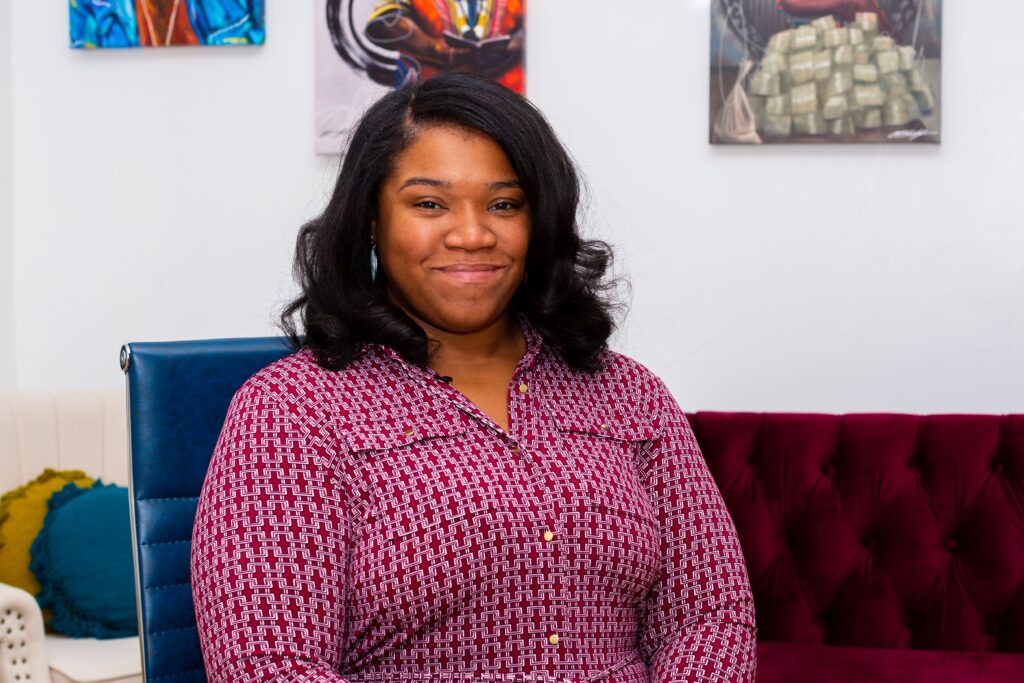When Sarah Woodson was working at the Marijuana Industry Group a few years ago, she developed an understanding about how cannabis laws were being made, how lobbyists worked, and how difficult it was for people of color to participate in the industry.
“It was apparent that there were no voices that represented the black and brown communities,” Woodson said.
In 2019, Woodson founded The Color of Cannabis to give people of color more representation in an industry that is dominated by white men. The nonprofit, which has grown to 60 members, advocates for black and brown people to participate in the regulated market. It’s helped craft legislation that ensures that the communities hardest hit by the War on Drugs have the opportunity to profit from an industry that has a high barrier to entry, both because of strict regulation and the cost of getting the proper licenses. Among the bills the organization helped craft was the Cannabis Advance Program, which would create a new state fund to advance cannabis industry involvement in communities impacted by the war on drugs.
In addition to lobbying work, The Color of Cannabis offers a ten week cannabis business course taught by industry insiders and experts. The course, held for several hours on Saturdays, is designed for entrepreneurs who want to start a wide range of cannabis businesses, including cultivation, manufacturing infused products, delivery, and retail. Classes cover everything from the history of cannabis and cultivation to banking and compliance.
The organization also hosts expungement clinics and monthly meetings with industry experts where applicants can learn about everything from hiring a consultant to finding the right location.
Colorado cannabis companies Terrapin Care Station and Native Roots have provided financial and human capital to The Color of Cannabis since the organization’s inception. Woodson said finding more sponsors would enable The Color of Cannabis to hire more people to work with social equity candidates full time.
“Two sponsors to fund an entire organization that’s ushering in social equity in Colorado is not adequate, but we make do with what we have,” Woodson said.
While the organization has a physical location — dubbed Welton Workspace — in Denver’s historically Black Five Points neighborhood, the pandemic has prevented them from hosting courses and events there, so everything has been held virtually.
“Even though the platform is virtual, it’s intimate and nice,” Woodson said.
The first cohort to go through the course included 16 people, 12 of whom graduated. In order to graduate from the course, you cannot miss more than two classes, Woodson said. The organization’s second cohort began on March 13.

Among the graduates from the first cohort is LaTaunia Terry-Hall, whose business Exquisite Delivery has now been certified as a social equity licensee. Terry-Hall, who expects to launch Exquisite Delivery this month, said the 10-week course was invaluable.
“Delivery seems to be the most feasible way to segue into the cannabis industry,” she said. “Without Sarah’s help, navigating through the process to become a social equity licensee would have been very difficult.”
In order to operate a delivery business in either Denver or Aurora, it must qualify as a social equity licensee, and The Color of Cannabis helped draft the legislation that defines that. To qualify for a social equity license, an applicant must be a Colorado resident and not previously have owned a marijuana business that was subject to revocation. Applicants also must meet one of the following to qualify:
- Resided for at least 15 years between 1980 and 2010 in a census tract designated by the Office of Economic Development and International Trade as an opportunity zone or designated as a disproportionate impacted area
- Applicant or applicant’s parent, legal guardian, sibling, spouse, child or minor in their guardianship was arrested for a marijuana offense, convicted of a marijuana offense or was subject to civil asset forfeiture related to a marijuana investigation
- Have household income in the year prior to application that did not exceed 50% of median household income.
The social equity licensee also must hold at least 51% ownership in the business.
Colorado legalized delivery in 2019, allowing for medical deliveries in 2020 and recreational deliveries in 2021. So far, only a handful of the state’s municipalities permit medical cannabis delivery within their borders: Boulder, Longmont, and Superior.
Aurora, which has 24 recreational dispensaries but no medical program, is expected to be the first to offer delivery of adult-use cannabis, with Denver to follow on July 1. Both cities will only issue licenses for delivery to state-licensed social equity applicants for the first three years after they launch. None of the cannabis retailers located in Aurora is owned by a social equity licensee.
“We’ve talked to several dispensaries to give them a layout of what this will look like, and what it will look like if they do it themselves,” Terry-Hall said. “It will be pretty efficient to do it with a third party. You won’t have to pull away one of your employees to deliver products.”
Terry-Hall is still working out pricing for Exquisite Delivery’s services. She said there likely will be a flat rate for retailers that plan to use the service on a regular basis as well as an hourly rate for those that will use it sporadically. Terry-Hall also anticipates that delivery drivers will receive tips from customers.
“Our goal is to be completely cashless to reduce the risk of theft and robbery,” said said. “It’s tricky but it’s doable.”
Terry-Hall said she’d like to explore other aspects of the cannabis industry, particularly cultivation.
After graduating from the Cannabis Business Course, Yadira Silva has started the process of getting her license for YS Cannabis Delivery Service AI LLC so she can provide delivery service in both Aurora and Denver.
“The Color of Cannabis has given me the opportunity to learn part of the cannabis business, including the legal part, examples of what to expect out of the industry and the regulations that occur within,” Silva said. “Education is the most valuable part — if you don’t know what you’re doing, you’re most likely going to fail.” Silva expects to be operating her delivery service by September.





